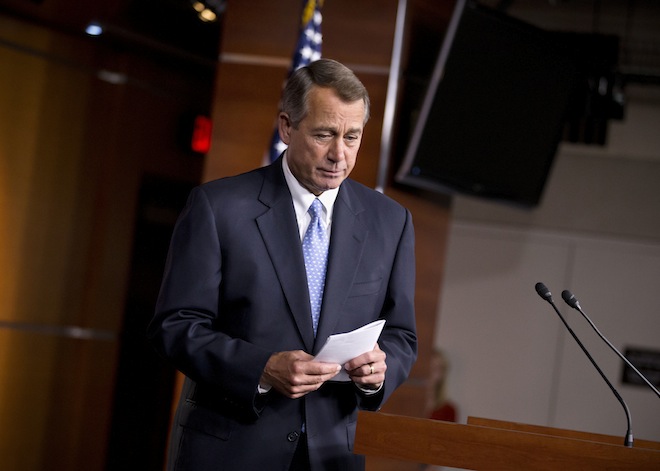Even as their hardliners refuse to let up, senior Republicans have all but conceded that they won’t end up defunding Obamacare in a continuing resolution to keep the federal government open after the money runs out on Sept. 30. And even if they do shut down the government, top Republicans observe, it won’t actually stop Obamacare. The strategy makes little sense.
But House Republican leaders are taking so much fire from conservative advocates that they’re weighing a more dangerous gambit: taking the United States’ ability to pay its bills hostage to advance the party’s goal of disrupting and dismantling the Affordable Care Act. The country’s borrowing authority is set to expire later this fall and senior Republicans made a series of promises to their members since January that appear likely to culminate in a showdown.
GOP leaders don’t see a way to persuade their members to lift the debt ceiling without attaching it to fiscal reforms. So a strategy they’re considering, first reported in the conservative news outlets National Review and Washington Examiner, is to pass a two-month continuing resolution to keep government funded at existing levels until, roughly, the debt limit is reached. Then they would offer a sequester replacement in exchange for delaying or defunding Obamacare in order to avoid economic disaster.
A House Republican leadership aide described this plan as an option, but cautioned TPM that no decisions have been made yet. “I do, however, expect that the President’s health care law will certainly come up — in some form or fashion — in the debt limit debate,” said the aide, who spoke on condition of anonymity to discuss internal strategy.
A second House GOP leadership aide also said no decisions have been made.
House Republicans are right that sequestration is a significant leverage point for them — they’ve largely embraced the indiscriminate spending cuts passed in 2011, while Democrats are eager to replace them. But a strategy of tying Obamacare to the debt ceiling carries a series of seemingly fatal flaws and potentially disastrous outcomes.
For starters, President Obama and his senior officials have vowed, repeatedly, not to negotiate on the debt ceiling under any circumstances. Their view is that the country’s borrowing limit is too important to subject to ideological debates, that raising it is Congress’ responsibility, and if they stand firm Republicans will be forced to back down. Back in January, when Obama refused to negotiate over the upcoming debt ceiling breach, they caved and ended up temporarily raising it without any substantial strings attached.
“We are not negotiating on the debt ceiling,” Obama told Democratic lawmakers just weeks ago.
But even if Democrats agreed to package a debt ceiling hike with other reforms, they’ve rejected repeated GOP efforts to damage Obamacare and they’re not about to cave now, on the eve of the law’s rollout. Not only would it show dramatic weakness and send the wrong signal at the wrong time, it would disrupt the frantic efforts of administration officials to make sure the law’s central provisions are ready to go live on Jan. 1. Enrollment on the insurance marketplaces begins on Oct. 1, after which delay is even less likely. And Obama is all but certain to veto a bill that meaningfully damages his signature achievement.
Which is why the gambit is extremely dangerous. If Republicans cater to conservative demands and raise expectations that Obamacare will be weakened in a debt limit deal, it could push Congress to the brink of letting the United States default on its debt, a move that stands to send shock waves through the economy, if not grind it to a halt.
The likelier endgame is that Republicans ultimately come up with a shiny object to distract their base and portray it as a concession by Democrats. That could include symbolic moves like Senate Democrats permitting a vote on House GOP legislation to delay parts of Obamacare, such as the individual mandate. Of course, Democrats would vote down such a bill, but it’d give Republicans a political weapon to use against vulnerable red-state Democrats in the 2014 elections, when they hope to win the Senate majority.
It won’t be easy for Republicans leaders to pull their members back from the brink, but as things stand, they probably won’t have a choice. As the White House sees it, ideological concessions such as weakening Obamacare and spending cuts are out of the question, and the debt ceiling debate ends either in a GOP cave or default.






